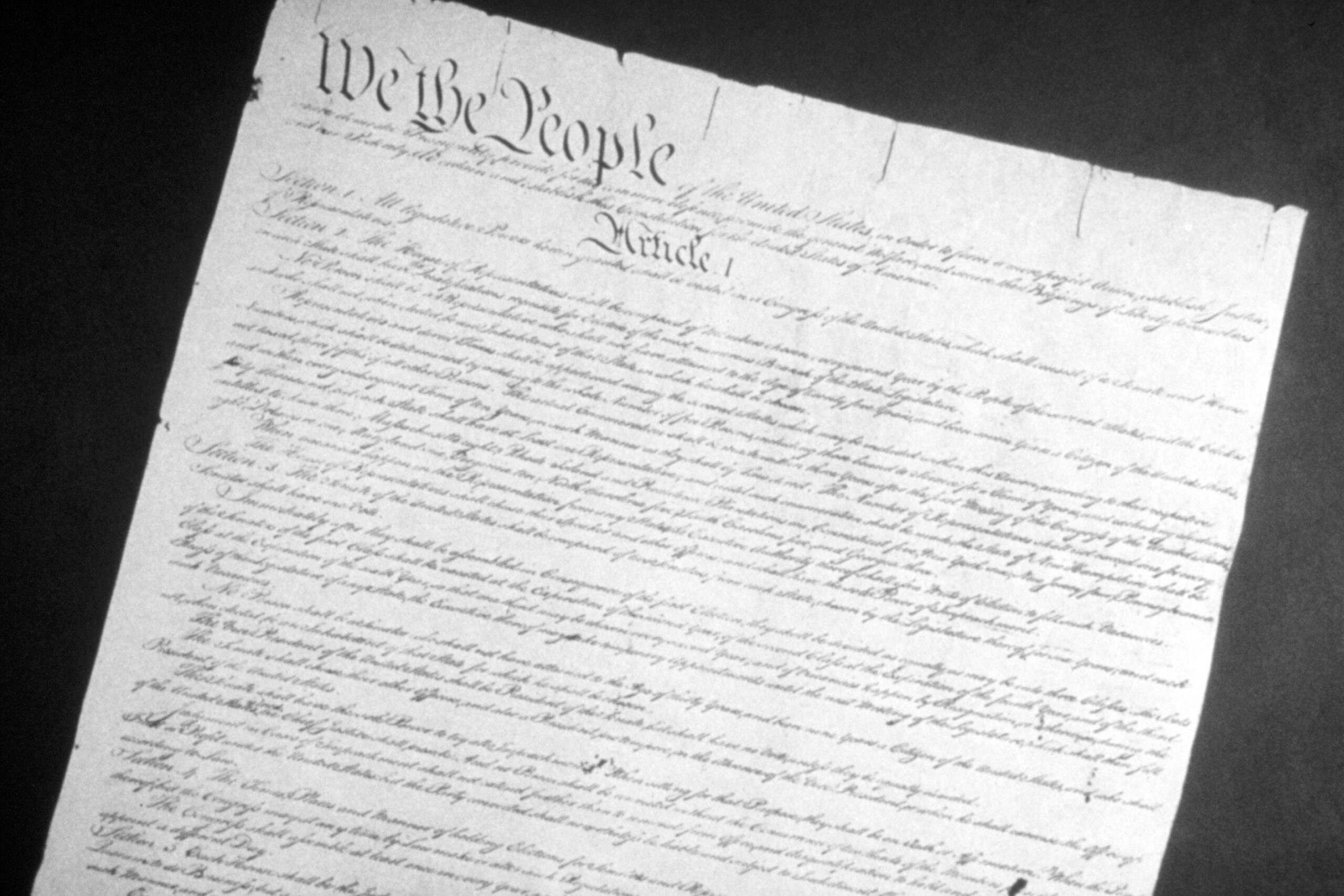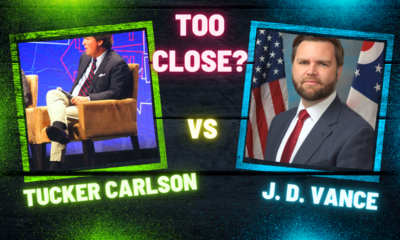Guest Columns
Words, Words, Words
Words mean things, but over the last centuries English speakers, especially in America, have corrupted their meaning.

Words everywhere. Words in laws passed by Congress, words in instructions for the devices that make our lives easier, words in novels and newspapers that edify us, words we use to convey our heartfelt sympathies, words we use to debate what course of action is good for our families and our country.
Corruption of words
We rely on words all of the time. Rarely, however, do we consider their intrinsic importance in holding our society together. Rarely do we recognize the ways we corrupt words.
We live in a time of fuzzy, destructively inaccurate, and phony words. This chips away at political and economic democracy and trivializes the most basic human interactions, such as love.
One of the great celebrations of words came from Stephen Vincent Benet in his poem “American Names.” It begins:
I have fallen in love with American names,
The sharp names that never get fat,
The snakeskin-titles of mining-claims,
The plumed war-bonnet of Medicine Hat,
Tucson and Deadwood and Lost Mule Flat.
Benet’s poem was a reminder that authentic words are loaded with meaning.
Sadly, piles of synthetic words litter American landscapes. All day long, cable television runs ads for medicines whose names cannot be found in dictionaries, such as Rinvoq, Jardiance, Caplyta, Xgeva, and Xanax. Their pronunciation is equally elusive.
Names like these are the inspiration of marketing experts – let’s call them corporate crooners – who want you to swoon over their medicine. The feeling usually is vertigo. Viagra and Levitra, for erectile dysfunction, are onomatopoeic. But what feeling does Jardiance convey? It sounds like a synonym for yellowing of the skin.
Corporate crooners also dream up names for banks – Citibank, Flagstar Bank, Synchrony Financial, and Synovus Financial – that are neither real words nor always grammatical. Amusingly, bank executives keep telling me their fondest wish is for a more literate workforce.
Gobbledygook
A good word for errant naming is gobbledygook. When Texas congressman Maury Maverick ran the Smaller War Plants Corporation during World War II, he directed his staff to “use plain English” instead of vague, pompous words that sounded like a strutting Turkey gobbling nonsense.
Public philosopher Harry Frankfurt had another down-to-earth term: As he wrote in a pithy book titled “On Bullshit,” bullshitters want to evoke feelings about themselves – for instance, politicians want to appear patriotic – or about a product they are selling, like a pill to curb diarrhea. They are not necessarily liars, Frankfurt wrote. They are simply “indifferent to how things really are.”
The devaluation of words can be traced to many sources. One of them is Hallmark, the ubiquitous greeting card conglomerate. Once upon a time, people wrote their most genuine feelings on pieces of paper. This required time and thought. Now their deepest sentiments are mass-produced and stuffed in racks in CVS. Meanwhile, Hallmark has become “a portfolio of businesses.” One of its subsidiaries is Crayola, which makes crayons and markers that are good for primitive communication.
Moving toward illiteracy
Nothing is more primitive than emoticons, which lie on the top of the slippery slope where we reside today. The generally recognized inventor of this form of communication – which is less creative than the bison our ancestors painted on cave walls – is computer scientist Scott Fahlman. In 1982, he suggested that his Carnegie Mellon University students put a happy face on jocular email messages because people sometimes failed to understand they were supposed to be funny. How much better the world would be today if he had, instead, taught his students to better understand irony.
In the 17th century, scientists, political philosophers, and other Enlightenment thinkers worried about the inadequacy of words to convey complicated thought. Members of the newly founded Royal Society of London for Improving Natural Knowledge toyed with the idea of creating a new, more precise language. This did not happen. But existing languages became standardized. Universal education cemented the rules by emphasizing disciplined writing.
Today we are moving backward. A survey by the Organization for Economic Cooperation and Development, carried out just before COVID struck, found that only 9% of 15-year-old students in industrialized countries were “able to successfully distinguish facts from opinions.” The pandemic, of course, only made matters worse.
As for the United States, it currently ranks sixth in reading among industrialized countries in the OECD. But before any backslapping ensues, consider that by other measures, one-fifth of all American adults are illiterate or border on illiteracy.
No grammar or syntactical rules on social media
We can blame “digital distraction” for some of this. Young people spend their days emailing, twittering, and snapchatting. Communicating in tiny information bites is as intellectually nourishing as subsisting on marshmallows. Equally problematic, social media sites are a rule-free zone. They are ephemeral, not ink-on-paper, so what the heck. Don’t worry about complete sentences, with commas in the correct places, any more than you worry about producing a well-rounded thought.
Automated writing will make matters worse. For some years, students have relied on auto-correct programs to cover up their ignorance of spelling and punctuation. The worry now is that artificial intelligence will ease them into Aldous Huxley’s “Brave New World,” where people take happy pills and let someone else worry about gathering and communicating information.
The guardians of words have failed in their mission
We also can blame traditional guardians of words for degrading them. Editors, for instance.
Elite book publishing houses were famous for nurturing authors and their manuscripts. Editors helped make writers like Ernest Hemingway and William Faulkner better than they already were. As the venerable publishers have morphed into corporate behemoths, however, editors have become “more managerial, less editorial,” says Dan Sinykin in his book “Big Fiction.” They focus on the “business and marketing side” of the enterprise. Agents often tell authors to hire an editor before submitting their book to a publisher. That might, indeed, help secure a contract, but, in any case, authors can’t count on the publisher to put much effort into simple line editing.
Newspaper book reviewing is diminished, too. The number of stand-alone Sunday book reviews has dwindled. The New York Times’ review, which started in 1911, is the most influential. But it has squandered its power by using up valuable space on such trivialities as interviewing Bruce Springsteen about his favorite books. Publishers Weekly, which once was a good guide to forthcoming books, overlooks so many important ones I’ve given up my subscription.
Up to this point, I have skirted around politics and the English language, which happens to be the title of one of George Orwell’s most famous essays. Written in 1946, it argued that we undermine democracy by letting politicians get away with “euphemism, question-begging, and sheer cloudy vagueness.”
“If thought corrupts language,” Orwell wrote, “language can also corrupt thought.”
Fake news is centuries old
In a later column, I will describe the origins of “fake news,” which is a peculiar kind of debasement of political communication.
Suffice it to say here that former President Trump did not invent the term as he claims he did, or the concept. It was widespread in the 19th century. Trump’s contribution to this field of lexicography is that he has perfected use of the term to discredit accurate reports that he finds inconvenient. We can give him credit for naming his hotels after himself. At least they have a real name, although the name is not so majestic as Lost Mule Flat. But the political bad habit of fighting truth by calling it lies is the worm in the apple of democracy.
Words! Words! Words! – I’m so sick of words!
I get words all day through;
First from him, now from you!
Is that all you blighters can do? From My Fair Lady
But we would be more exasperated without all the words. Democracy, wrote John Dewey, one of the 20th century’s greatest public intellectuals, “implies tools for getting at the truth.” Sound words, soundly written are the most basic. These are the hammers and chisels that enlighten and move us.
This gets us back to the example set by Stephen Vincent Benet’s poem. He used a common racial signifier that passed muster then and would not today. But at the end of the poem, he showed the genuine evocative power of words with a reference to the slaughter of some 300 Lakota people in 1890.
You may bury my body in Sussex grass,
You may bury my tongue at Champmedy.
I shall not be there. I shall rise and pass.
Bury my heart at Wounded Knee.
This article was originally published by RealClearPolitics and made available via RealClearWire.
John Maxwell Hamilton, a longtime journalist, author and public servant, is the Hopkins P. Breazeale Professor of Journalism at the LSU Manship School of Mass Communication and a global scholar at the Woodrow Wilson International Center for Scholars, Washington, D.C. His most recent book is Manipulating the Masses: Woodrow Wilson and the Birth of American Propaganda.
The views that Mr. Hamilton expresses here are his own and do not necessarily reflect those of Conservative News and Views.
-

 Civilization1 day ago
Civilization1 day agoWhy Europe Shouldn’t Be Upset at Trump’s Venezuelan Actions
-

 Accountability4 days ago
Accountability4 days agoWaste of the Day: Principal Bought Lobster with School Funds
-

 Executive2 days ago
Executive2 days agoHow Relaxed COVID-Era Rules Fueled Minnesota’s Biggest Scam
-

 Constitution3 days ago
Constitution3 days agoTrump, Canada, and the Constitutional Problem Beneath the Bridge
-

 Christianity Today1 day ago
Christianity Today1 day agoSurprising Revival: Gen Z Men & Highly Educated Lead Return to Religion
-

 Civilization2 days ago
Civilization2 days agoThe End of Purple States and Competitive Districts
-

 Executive2 days ago
Executive2 days agoWaste of the Day: Can You Hear Me Now?
-

 Executive3 days ago
Executive3 days agoWaste of the Day: States Spent Welfare in “Crazy Ways”














